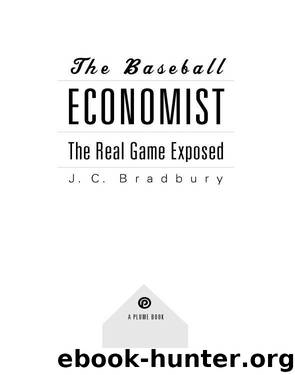The Baseball Economist by J.C. Bradbury

Author:J.C. Bradbury
Language: eng
Format: epub
Publisher: Penguin Publishing Group
Great Innovators
Branch Rickey is the man all general managers aspire to be. Rickey made his mark on the baseball world by bringing several innovations to the game. His first notable invention was the modern minor-league farm system, which he employed with the St. Louis Cardinals to win six NL pennants and four World Series for the previously inept franchise. He is also known for trading star players before age caused their play to decline, employing a statistician, and attempting to start a third major league. But his most famous innovation was the integration of Major League Baseball, with the signing of Jackie Robinson to the Brooklyn Dodgers in 1947. This was not just an important ethical move and the beginning of the correction of gross social injustice. Rickey certainly realized the political importance of this moment, but even from a baseball management standpoint this was a fantastic move. It took advantage of an untapped talent pool that was ignored out of racial prejudice. The Negro Leagues contained many players who could not only play major-league-quality baseball, but would excel at it. Robinson exploded into the National League, winning “Rookie of the Year” in 1947, a batting title (1949), and MVP (1949), while taking the Dodgers to six World Series over his career.
Rickey didn’t just get lucky. He knew the Negro Leagues contained a gold mine of big-league players, and the only thing holding them back was an irrational prejudice. After signing Robinson to a minor-league deal in 1946, Rickey announced to the world what he was doing. “The greatest untapped reservoir of raw material in the history of our game is the black race,” he said. Rickey also signed other Negro League stand-outs, who would become National League All-Stars, such as Roy Campanella and Don Newcombe.
Rickey saw an inefficiency in the market and exploited it at the expense of his competitors. And it didn’t take long for other teams to see what a bargain Branch Rickey had found. Eleven weeks after Robinson joined the Dodgers, the Cleveland Indians signed Larry Doby to be the first black player in the American League. In his first full season in the majors (1948) he helped the Indians win the World Series. In fact, the teams that were quick to integrate were reaping huge rewards in wins. By exploiting the inefficient use—or nonuse—of black talent, teams were able to win more games.
Eventually, black talent spread throughout the major leagues, with the best Negro League talent jumping to the AL and NL, until there were no more gains to be had by adding additional talent. This demonstrates one of the other characteristics of innovation: successful innovative practices will spread. Once the rest of baseball realized the success of black athletes, the inefficiency went away. Players who were once cheap and untouchable became caught in bidding wars between teams. The price of talent again rose to its old level, where black and white players of equal talent cost teams the same. The market for baseball talent was no longer inefficient when it came to race.
Download
This site does not store any files on its server. We only index and link to content provided by other sites. Please contact the content providers to delete copyright contents if any and email us, we'll remove relevant links or contents immediately.
International Integration of the Brazilian Economy by Elias C. Grivoyannis(111057)
The Radium Girls by Kate Moore(12026)
Turbulence by E. J. Noyes(8047)
Nudge - Improving Decisions about Health, Wealth, and Happiness by Thaler Sunstein(7706)
The Black Swan by Nassim Nicholas Taleb(7128)
Rich Dad Poor Dad by Robert T. Kiyosaki(6631)
Pioneering Portfolio Management by David F. Swensen(6300)
Man-made Catastrophes and Risk Information Concealment by Dmitry Chernov & Didier Sornette(6019)
Zero to One by Peter Thiel(5798)
Secrecy World by Jake Bernstein(4751)
Millionaire: The Philanderer, Gambler, and Duelist Who Invented Modern Finance by Janet Gleeson(4478)
The Age of Surveillance Capitalism by Shoshana Zuboff(4291)
Skin in the Game by Nassim Nicholas Taleb(4248)
The Money Culture by Michael Lewis(4206)
Bullshit Jobs by David Graeber(4190)
Skin in the Game: Hidden Asymmetries in Daily Life by Nassim Nicholas Taleb(4004)
The Dhandho Investor by Mohnish Pabrai(3764)
The Wisdom of Finance by Mihir Desai(3746)
Blockchain Basics by Daniel Drescher(3581)
